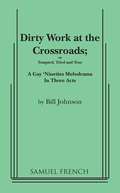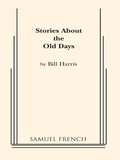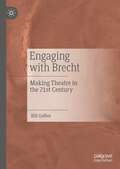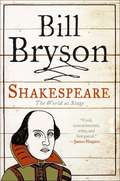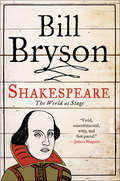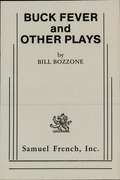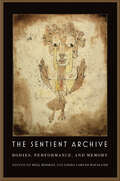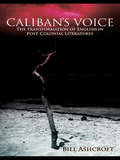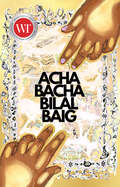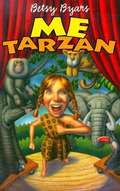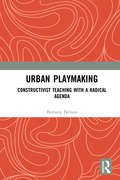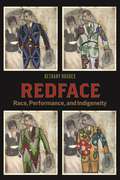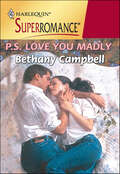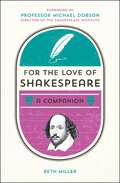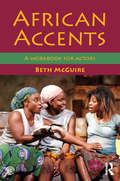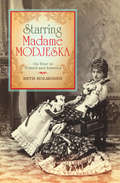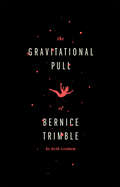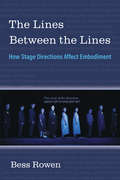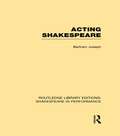- Table View
- List View
Dirty Work at the Crossroads
by Bill JohnsonGay '90s Melodrama / 3m, 7f / This play tells in laughable style the tear jerking story of Nellie Lovelace, an innocent country girl. Munro, the viper, has a wife in Ida Rhinegold, belle of the New Haven Music Halls, but that does not prevent him from pursuing Nellie and tearing her from the arms of her dying mother (whom he has poisoned). Nor does it prevent him from driving Adam Oakhart, the blacksmith's son, to drink, from blackmailing rich Mrs. Asterbilt, or from bewitching her daughter, Leonie. There are a number of places in the plot where old time songs are introduced. The text contains full directions for production. Suggestions for the music, all business tableaux, curtain calls, etc., are there. May be performed by all male or female casts which add to its mirth provoking possibilities.
Stories About the Old Days
by Bill HarrisA former blues singer living in a decaying church in Detroit never ventures out into the world that rejected him. While playing checkers he and Ivy, one the last members of the congregation, move from animosity to friendship. Both have secrets from the old days: he conceals his struggle of faith and despair and she withholds a searing loss as they rescue each other from emotional numbness and terminal loneliness. This wonderful play with superb roles for older Black actors was produced to acclaim in New York at the Henry Street Settlement.
Auseinandersetzung mit Brecht: Theater machen im einundzwanzigsten Jahrhundert
by Bill GelberDieses Buch ist ein Plädoyer für Bertolt Brechts anhaltende Bedeutung in einer Zeit, in der die Ereignisse des 21. Jahrhunderts nach einer studierten Art und Weise schreien, Theater für den sozialen Wandel zu produzieren. Hier wird ein einzigartiger Schritt-für-Schritt-Prozess für die Umsetzung von Brechts Arbeitsweisen auf der Bühne vorgestellt, wobei die 2015 an der Texas Tech University entstandene Produktion von Brechts "Mutter Courage und ihre Kinder" als Modell für die Erkundung dient. Besondere Brecht-Konzepte - das Epos, die Verfremdung, die Fabel, der Gestus, die Historisierung, die Literarisierung, das "Nicht...aber", das Arrangement und die Trennung der Elemente - werden erläutert und auf Szenen und Stücke angewendet. Brechts komplizierte Beziehung zu Konstantin Stanislawski wird auch in Bezug auf ihre unterschiedlichen Ansichten über das Schauspiel erforscht. Für Theaterpraktiker und -pädagogen ist dieser Band eine Aufzeichnung des pädagogischen Engagements, eine empirische Studie von Brechts Werk in der Aufführung an einer höheren Bildungseinrichtung mit Studenten und Absolventen.
Engaging with Brecht: Making Theatre in the Twenty-first Century
by Bill GelberThis book makes the case for Bertolt Brecht’s continued importance at a time when events of the 21st century cry out for a studied means of producing theatre for social change. Here is a unique step-by-step process for realizing Brecht’s ways of working onstage using the 2015 Texas Tech University production of Brecht’s Mother Courage and Her Children as a model for exploration. Particular Brecht concepts—the epic, Verfremdung, the Fabel, gestus, historicization, literarization, the “Not…but,” Arrangement, and the Separation of the Elements—are explained and applied to scenes and plays. Brecht’s complicated relationship with Konstantin Stanislavsky is also explored in relation to their separate views on acting. For theatrical practitioners and educators, this volume is a record of pedagogical engagement, an empirical study of Brecht’s work in performance at a higher institution of learning using graduate and undergraduate students.
Shakespeare: The World as Stage
by Bill BrysonAmerican native Bryson, alive and well in England, sets out what little is known about the life of the Elizabethan playwright and samples the voluminous scholarship about his work and its influence on English as a language and a body of literature. His approach is lighthearted and non-technical. Annotation ©2008 Book News, Inc., Portland, OR (booknews.com)
Shakespeare: The World as Stage
by Bill BrysonBill Bryson's bestselling biography of William Shakespeare takes the reader on an enthralling tour through Elizabethan England and the eccentricities of Shakespearean scholarship--updated with a new introduction by the author to commemorate the 400th anniversary of Shakespeare's deathWilliam Shakespeare, the most celebrated poet in the English language, left behind nearly a million words of text, but his biography has long been a thicket of wild supposition arranged around scant facts. With a steady hand and his trademark wit, Bill Bryson sorts through this colorful muddle to reveal the man himself. His Shakespeare is like no one else's--the beneficiary of Bryson's genial nature, his engaging skepticism, and a gift for storytelling unrivaled in our time.
Buck Fever & Other Plays
by Bill BozzoneComedy / 3m, 1f / Interior / A remarkable and hilarious play about two hunting buddies who, upon returning to their cabin in the woods, discover that their wives have become lovers in the husbands' absence and then absconded with the only car, leaving the miserable (and very confused) husbands stranded alone. Fully expecting the return of their wayward wives, the husbands decide to jump into bed together, so that upon their return, the wives, will see just how ridiculous homosexuality looks. What the husbands don't expect is their discovery in bed by another hunting buddy and his date.
The Sentient Archive: Bodies, Performance, and Memory
by Bill Bissell and Linda Caruso HavilandThe Sentient Archive gathers the work of scholars and practitioners in dance, performance, science, and the visual arts. Its twenty-eight rich and challenging essays cross boundaries within and between disciplines, and illustrate how the body serves as a repository for knowledge. Contributors include Nancy Goldner, Marcia B. Siegel, Jenn Joy, Alain Platel, Catherine J. Stevens, Meg Stuart, André Lepecki, Ralph Lemon, and other notable scholars and artists.Hardcover is un-jacketed.
Caliban's Voice: The Transformation of English in Post-Colonial Literatures
by Bill AshcroftIn Shakespeare’s Tempest, Caliban says to Miranda and Prospero: "...you taught me language, and my profit on’t Is, I know how to curse. " With this statement, he gives voice to an issue that lies at the centre of post-colonial studies. Can Caliban own Prospero’s language? Can he use it to do more than curse? Caliban’s Voice examines the ways in which post-colonial literatures have transformed English to redefine what we understand to be ‘English Literature’. It investigates the importance of language learning in the imperial mission, the function of language in ideas of race and place, the link between language and identity, the move from orature to literature and the significance of translation. By demonstrating the dialogue that occurs between writers and readers in literature, Bill Ashcroft argues that cultural identity is not locked up in language, but that language, even a dominant colonial language, can be transformed to convey the realities of many different cultures. Using the figure of Caliban, Ashcroft weaves a consistent and resonant thread through his discussion of the post-colonial experience of life in the English language, and the power of its transformation into new and creative forms.
Acha Bacha
by Bilal BaigFor years, Zaya has delicately balanced his relationship with his Muslim faith and queer identity by keeping his genderqueer lover and manipulative mother apart. But when his mother ends up in the hospital on the same day his partner is leaving for pilgrimage, Zaya’s worlds come crashing in on each other, opening a space for traumatic memories to resurface. Acha Bacha boldly explores the intersections between queerness, gender identity and Islamic culture in the Pakistani diaspora. It’s about the way we love, the way we are loved and what it takes to truly accept love.
A View from A Broad
by Bette MidlerBette Midler, also known as Divine Miss M--the indomitable and incomparable singer, actor, and musical theater extraordinaire, with a career spanning almost half a century--revisits her classic memoir, now with a new introduction.This book was a kind of last hurrah. When I read it, I hear a disarmingly younger, sweeter voice...I am not sure that this little confection captures a whole time, but I think it's an accurate picture of the spirit and tone of what I was doing in those days...I hope it holds up, and that you find your best younger self in it as I do... With her brassy voice and bold performances making the world finally pay attention, this ambitious Jewish girl from Hawaii, needs no introduction. Grammy award-winning singer, Academy Award-nominee, Broadway star of her critically acclaimed one-woman show, and beloved actress in The Rose, Beaches, and Down and Out in Beverly Hills--Bette Midler is a household name whose career and fans span generations. In A View from A Broad, Bette relives her career through memories of endless rehearsals, her fear of flying, crazy schedules, and wisdom she learned from Thai Gondoliers with her trademark razor-blade wit that her fans have grown to know, love, and expect. Filled with photographs, a new introduction, and heartwarming stories that highlight only a portion of a brilliant career, A View from a Broad is the perfect gift for anyone who loves music, theater, or just plain fun--and will be cherished by the fans of Divine Miss M for years to come.
Me Tarzan
by Betsy ByarsNobody knew Dorothy could do such a tremendous Tarzan yell. Not Dwayne, Dorothy's enemy, who wants the part of Tarzan in the class play more than she does. Not Mr. Mooney, their teacher, who has no choice but to give Dorothy the part. Not Dorothy's parents, who are as uneasy as Mr. Mooney about it. Not even Dorothy! But when the uncontrollable urge comes over her--the smell of the jungle, the sense of raw, primitive emotions, the wildness--Dorothy lets out a Tarzan yell so loud, so effective, they all feel its incredible power. And so do the neighborhood animals. More and more animals gather whenever Dorothy practices. Then the circus comes to town, and a puma escapes to Dorothy's yard after one of her yells. What will happen on the night of the play--which also happens to be the opening night of the circus-when Dorothy is determined to give the yell of her life? Betsy Byars's lighthearted story is as exuberant and surprising as Dorothy's Tarzan yell.
Urban Playmaking: Constructivist Teaching with a Radical Agenda
by Bethany NelsonThis book explores the concept of playmaking and activism through three research projects in which culturally and linguistically diverse high school students and young adults created original theatre around the issues that inform their lives and constrain their futures. Each study discussed by the author is considered through the lens of one or more best practices. The outcomes of the playmaking experiences, communicated through detailed ethnographic data and the voices of student participants, make a strong case for using what we already know about teaching to positively impact gross inequities of outcome for culturally and linguistically diverse students. This study will be of great interest to students, scholars, and practitioners in Applied Theatre, Theatre Education, and Art Therapy.
Redface: Race, Performance, and Indigeneity (Performance and American Cultures)
by Bethany HughesConsiders the character of the “Stage Indian” in American theater and its racial and political impact Redface unearths the history of the theatrical phenomenon of redface in nineteenth- and twentieth-century America. Like blackface, redface was used to racialize Indigenous peoples and nations, and even more crucially, exclude them from full citizenship in the United States. Arguing that redface is more than just the costumes or makeup an actor wears, Bethany Hughes contends that it is a collaborative, curatorial process through which artists and audiences make certain bodies legible as “Indian.” By chronicling how performances and definitions of redface rely upon legibility and delineations of race that are culturally constructed and routinely shifting, this book offers an understanding of how redface works to naturalize a very particular version of history and, in doing so, mask its own performativity.Tracing the “Stage Indian” from its early nineteenth-century roots to its proliferation across theatrical entertainment forms and turn of the twenty-first century attempts to address its racist legacy, Redface uses case studies in law and civic life to understand its offstage impact. Hughes connects extensive scholarship on the “Indian” in American culture to the theatrical history of racial impersonation and critiques of settler colonialism, demonstrating redface’s high stakes for Indigenous and non-Indigenous alike. Revealing the persistence of redface and the challenges of fixing it, Redface closes by offering readers an embodied rehearsal of what it would mean to read not for the “Indian” but for Indigenous theater and performance as it has always existed in the US.
P.S. Love You Madly
by Bethany CampbellFAMILY: YOU DON'T GET TO CHOOSE THEM!Darcy's mother and Sloan's father are in love and want to get married. But Darcy's sister is aghast and Sloan's aunt is appalled. That leaves Darcy and Sloan trying to make everyone see sense. No problem, right?But then their parents break up-thanks to a little help from the families-just when Darcy and Sloan are falling in love.... Compared to what these two go through, Romeo and Juliet had it easy!Don't miss this book by award-winning and bestselling author Bethany Campbell. It's guaranteed to be one of the funniest romances you'll read this year!
For the Love of Shakespeare: A Companion
by Beth MillerThere’s never been a better time to take a fresh look at William Shakespeare’s eternal works. His plays and poems continue to surprise, inspire, console and delight us. Whether you’re a lifelong lover of the Bard or a curious newcomer to his world, this companion will lift the curtain on Britain’s greatest dramatist.
For the Love of Shakespeare: A Companion
by Beth MillerThere’s never been a better time to take a fresh look at William Shakespeare’s eternal works. His plays and poems continue to surprise, inspire, console and delight us. Whether you’re a lifelong lover of the Bard or a curious newcomer to his world, this companion will lift the curtain on Britain’s greatest dramatist.
African Accents: A Workbook for Actors
by Beth McGuireThis is a comprehensive workbook for actors, covering the key characteristics and profiles of a wide range of African accents of English. Its unique approach not only addresses the methods and processes by which to go about learning an accent, but also looks in detail at each example. This lets the reader plot their own route through the learning process and tailor not only their working methods but also their own personal idiolect. Full breakdowns of each accent cover: an introduction giving a brief history of the accent, its ethnic background, and its language of origin preparatory warm-up exercises specific to each accent a directory of research materials including documentaries, plays, films and online resources key characteristics such as melody, stress, pace and pitch descriptions of physical articulation in the tongue, lips, jaw, palate and pharynx practice sentences, phoneme tables and worksheets for solo study. African Accents is accompanied by a website at www.routledge.com/cw/mcguire with an extensive online database of audio samples for each accent. The book and audio resources guide actors to develop their own authentic accents, rather than simply to mimic native speakers. This process allows the actor to personalize an accent, and to integrate it into the creation of character rather than to play the accent on top of character.
Starring Madame Modjeska: On Tour in Poland and America
by Beth HolmgrenThe &“important . . . meticulously researched&” prize-winning biography of the pre-eminent Polish star of the nineteenth century global stage (CosmopolinReview.com). In reintroducing &“a little-remembered actress to a new American audience&” biographer Beth Holgram delivers a revelatory portrait of Helena Modjeska—from unparalleled European success to her reign as the most acclaimed, and most recognized female celebrity in the late nineteenth-century United States. In 1876, Poland&’s leading actress, Helena Modrzejewska, accompanied by her husband, the self-stylized Count Bozente, emigrated to southern California to give up her career and establish a utopian commune. In light of its failings, it hardly fulfilled the real dreams of Madame Helena. Within a year, she changed her surname to Modjeska, and made her American debut at San Francisco&’s California Theatre. Godmother to Ethel Barrymore, and sharing the Shakespearian stage with such luminaries as Otis Skinner, Edwin Booth, and Maurice Barrymore, Helena Modjeska became the leading star in the United States, where she reigned for the next thirty years. In this &“Impressive . . . achievement,&” Holmgren traces Modjeska&’s fabulous life and career from her illegitimate birth in Krakow, to her successive reinventions of herself as a trans-continental diva, and finally to her enduring legacy (Women&’s Review of Books). All in all, Starring Madame Modjeska &“makes for great drama&” (NewPages.com).
Pretty Goblins
by Beth GrahamFrom holding hands in the womb to holding each other’s hair back when they puked, twins Laura and Lizzie grew up only having each other. They couldn’t count on their practically feral mom, absent dad, or even the boys they liked. They’re polar opposites—Laura’s reserved while Lizzie’s reckless—but their shared mischievous giggles and dreams for the future kept them going. One day, Laura finds a familiar book of poems in Lizzie’s apartment and is dragged through their turbulent past. Together, the sisters relive their complicated history in an effort to make sense of the present. Framed by the beauty of a well-loved poem, this story of ferocious sisterhood, addiction, and the aftermath of trauma will leave howls echoing in your ears.
The Gravitational Pull of Bernice Trimble
by Beth GrahamIris Trimble is trying to hold it all together. She may very well fly off the face of the earth if she doesn't hang on to the kitchen counter. At least that's how she feels after her mother, Bernice, a lively, recently widowed fifty-nine-year-old breaks the news that she has Alzheimer's. In an effort to cope with the stress, Iris makes her mother's famous Everything That Is Bad For You Casserole, a childhood favourite. Her siblings, on the other hand, are on opposite sides of the spectrum: Sarah, the eldest, irately demands a second opinion, while Peter, the youngest, seems completely unfazed. As for Bernice, she's still as vivacious as ever, always up for a good laugh, and, most of all, ready to finally put herself first.
Sister Switch
by Beth GarrodA laugh-out-loud, modern take on the ever popular body-swap story from bestselling author Beth Garrod. Perfect for 9+ fans of Rachel Renée Russell's Dork Diaries and Alesha Dixon&’s Star Switch. Twelve-year-old Lily Mavers and her sister, Erin, do not get on. It doesn&’t help that Lily has nothing in common with her overachieving, Grade A student sister. But after an emergency trip to the oddly named Hairy Godmother salon, Lily and Erin leave with much more than a new look – they&’ve got a whole new life. Because the sisters have undergone a full-on body switch and they're about to find out that life in each other's shoes is much harder than it looks!Praise for Sister Switch: &‘World-class and whip-smart comedy magically mixed with a sweet message about sibling friendship. I absolutely loved it!&’ Sibéal Pounder, bestselling author of the Bad Mermaid series
The Lines Between the Lines: How Stage Directions Affect Embodiment
by Bess RowenWhat is the purpose of a stage direction? These italicized lines written in between the lines of spoken dialogue tell us a great deal of information about a play's genre, mood, tone, visual setting, cast of characters, and more. Yet generations of actors have been taught to cross these words out as records of previous performances or signs of overly controlling playwrights, while scholars have either treated them as problems to be solved or as silent lines of dialogue. Stage directions can be all of these things, and yet there are examples from over one-hundred years of American playwriting that show that stage directions can also be so much more. The Lines Between the Lines focuses on how playwrights have written stage directions that engage readers, production team members, and scholars in a process of embodied creation in order to determine meaning. Author Bess Rowen calls the products of this method “affective stage directions” because they reach out from the page and affect the bodies of those who encounter them. Affective stage directions do not tell a reader or production team what a given moment looks like, but rather how a moment feels. In this way, these stage directions provide playgrounds for individual readers or production teams to make sense of a given moment in a play based on their own individual cultural experience, geographic location, and identity-markers. Affective stage directions enable us to check our assumptions about what kinds of bodies are represented on stage, allowing for a greater multitude of voices and kinds of embodied identity to make their own interpretations of a play while still following the text exactly. The tools provided in this book are as useful for the theater scholar as they are for the theater audience member, casting director, and actor. Each chapter covers a different function of stage directions (spoken, affective, choreographic, multivalent, impossible) and looks at it through a different practical lens (focusing on actors, directors, designers, dramaturgs, and readers). Every embodied person will have a slightly different understanding of affective stage directions, and it is precisely this diversity that makes these stage directions crucial to understanding theater in our time.
Acting Shakespeare (Routledge Library Editions: Shakespeare in Performance)
by Bertram Leon JosephHow did the actors for whom Shakespeare wrote his plays make his characters come to life, how did they convey his words? Can modern directors, actors, and even library readers of Shakespeare learn from them? Creating character and making the Elizabethan playwright’s poetry compelling for the audience is a problem which has seldom been resolved in modern times. This book demonstrates the hard course a modern actor must follow to make real and truthful the words he speaks, and the action and emotion underlying them. With examples and simple exercises, this book helps with the preparation for the great task – providing the actor with a combination that unlocks the Bard's English. Starting with how theatrical speech was understood in Renaissance England, it looks at figures of speech, the powers of persuasion, and the passion and rhythm inherent in the language.
Bertolt Brecht: Journals 1934 - 1955 (Diaries, Letters And Essays Ser.)
by Bertolt BrechtThis book contains selected poems, plays, and prose by Bertolt Brecht taken from various points throughout his career. It includes translations of two prose works and provides some background information on Brecht's life and career.
